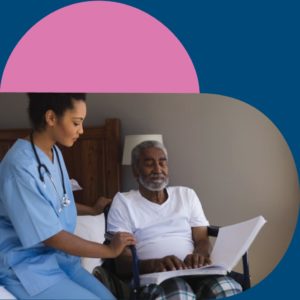

Our priority outcome: To encourage Lambeth residents to have an end of life care plan that reflects their wishes
We want Lambeth residents to have an advance care plan (ACP) that is developed by them with their healthcare professional and involves their family and caregivers. We want their care plan to be written clearly to support all services to respect their wishes during their final days and weeks. We want the document to be readily accessible to all those involved in the person’s care.

Context and key challenges
Advance care plans are written instructions for healthcare professionals about how a person wants to be cared for at the end of their life, should they become too unwell to express their wishes. The plan allows healthcare professionals to know what has been previously agreed by the patient. A person may change their preferences, and they can be confident that their wishes are known whether or not they are able to continue to communicate.
The plan may support a person in decisions about where to die or about receiving more active treatment until the time of their death.
What we offer
In order to meet our ambition of encouraging more people in Lambeth to have an advance care plan, we agreed on a number of actions. These included: creating a group of key people willing to work together and make positive change; providing training and development for our workforce in GP practices to provide better support with end-of-life care; and developing a Frequently Asked Questions (FAQ) sheet in consultation with local people, answering their concerns and questions related to end of life care planning.
GP practice support
We recruited two end of life clinical leads (both GPs situated in opposite parts of Lambeth) to lead this programme. The clinical leads provide tailored support and expertise to individual GP practices – identifying training and system support needs – and champion the project to key partners in GP practices, our local hospitals and hospices and beyond.
In addition, we held training and development sessions for clinical and non-clinical GP practice staff. With over 100 attendees, we improved staff understanding and confidence to signpost residents to services and initiate conversations related to planning for end of life care; we also equipped them with advice and suggestions for ways they can help ensure an advance care plan reflects a patient’s wishes and beliefs.
Frequently Asked Questions sheet
Working with partners across the health system, we held a workshop with key stakeholders (including staff from GP practices, hospital services, South London and the Maudsley mental health services, London Ambulance Service and St Christopher’s Hospice) and local resident representatives to agree on what makes a good advance care plan. This culminated in listening to those with lived experience and end of life care colleagues who reflected that cultural beliefs are key to respecting a patient’s wishes in their final moments. As a result, the partners created a scoring template to be used by GP practice staff when completing an advance care plan to help indicate the minimum requirements for a good advance care plan.
Our impact
We supported the transition to using a London-wide digital platform to share advance care plans. We worked closely with GP practices, local residents, and partner organisations such as Healthwatch to develop the End of Life Frequently Asked Question sheet, which has received strong feedback from those choosing to have an ACP.
Through collaborative working, we have seen an increase the number of Lambeth residents having a completed advance care plan recorded and readily available to be viewed by all health services. This means more residents’ wishes will be followed through when it comes to their last stages of life. It may also result in a reduction in unnecessary hospital admissions and mean that distress for both the patient and their family and carers can be minimised.
Our next steps
We have further ambitions working with partners to co-create with local residents a map of services and organisations available in Lambeth for those requiring support related to their last stages of life. This will also map support available for their carers and families.
We will work with Guy’s and St Thomas’ NHS Foundation Trust to relaunch within the hospital, across community health teams and (for the first time) into Primary Care their ‘Let’s Talk’ resources for patients and clinicians which they developed ‘just before the pandemic. The materials will also be reviewed to better address the diversity of our local population.

Case study: A view from Dr Justin Hayes, clinical lead for end of life care
My motivation in working as a clinical lead is to ensure that my patients and everyone approaching the end of their life has choices and is able to let their caregivers know their preferences regarding their care. I quickly realised that for this to happen, we had to ensure that all caregivers could communicate with one another and could access the individual’s plan in order to offer the best and most personalised support. So, I got involved in the digital transformation programme.
In July the digital platform for end of life and palliative care for Londoners was migrated. This was a huge project that enabled changes to be made to the way that those involved in a person’s care across community and hospital settings can access this vital information. Switching from one system (Coordinate my Care, or CMC) to another (Urgent Care Plan, or UCP) involved modifications to computers in every London hospital, general practice and community health setting, and crucially, included London Ambulance Service and ‘Out of Hours’ services.
Although there were some individual wrinkles in access, the migration of care plans from CMC to UCP was remarkably smooth, with the software functioning well and being easy to navigate. This meant that different teams supporting local people near the end of life were able to communicate with one another about patients’ wishes and plans for their care. It also meant that, in emergency situations, London Ambulance Service could know quickly and confidently how to support patients either with care at home or where appropriate by transferring to hospital. And most importantly, we know these plans ensure that both patient and their families’ end of life care wishes are respected.
Dr Justin Hayes, End of Life Care Clinical Lead and Lambeth GP